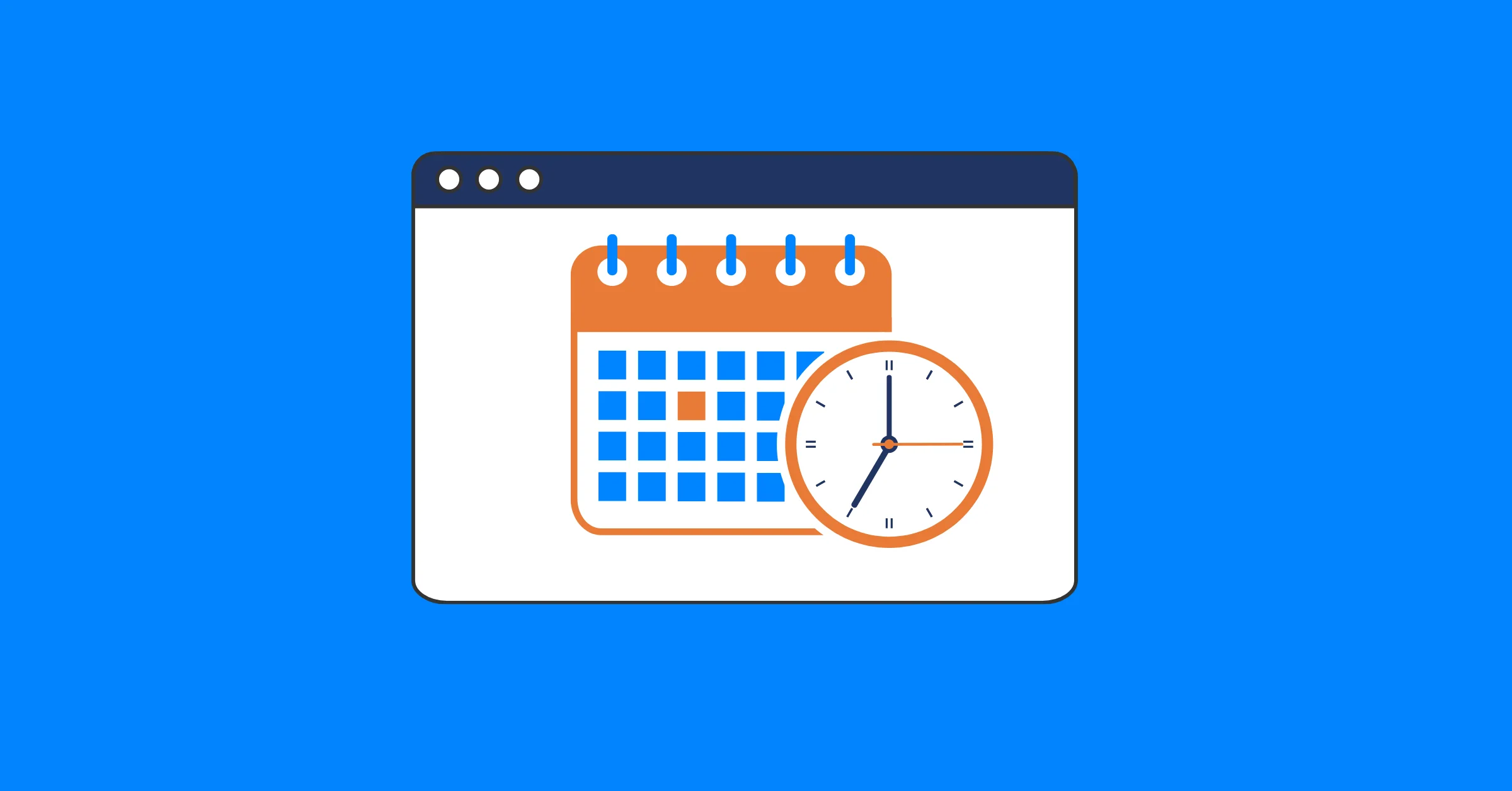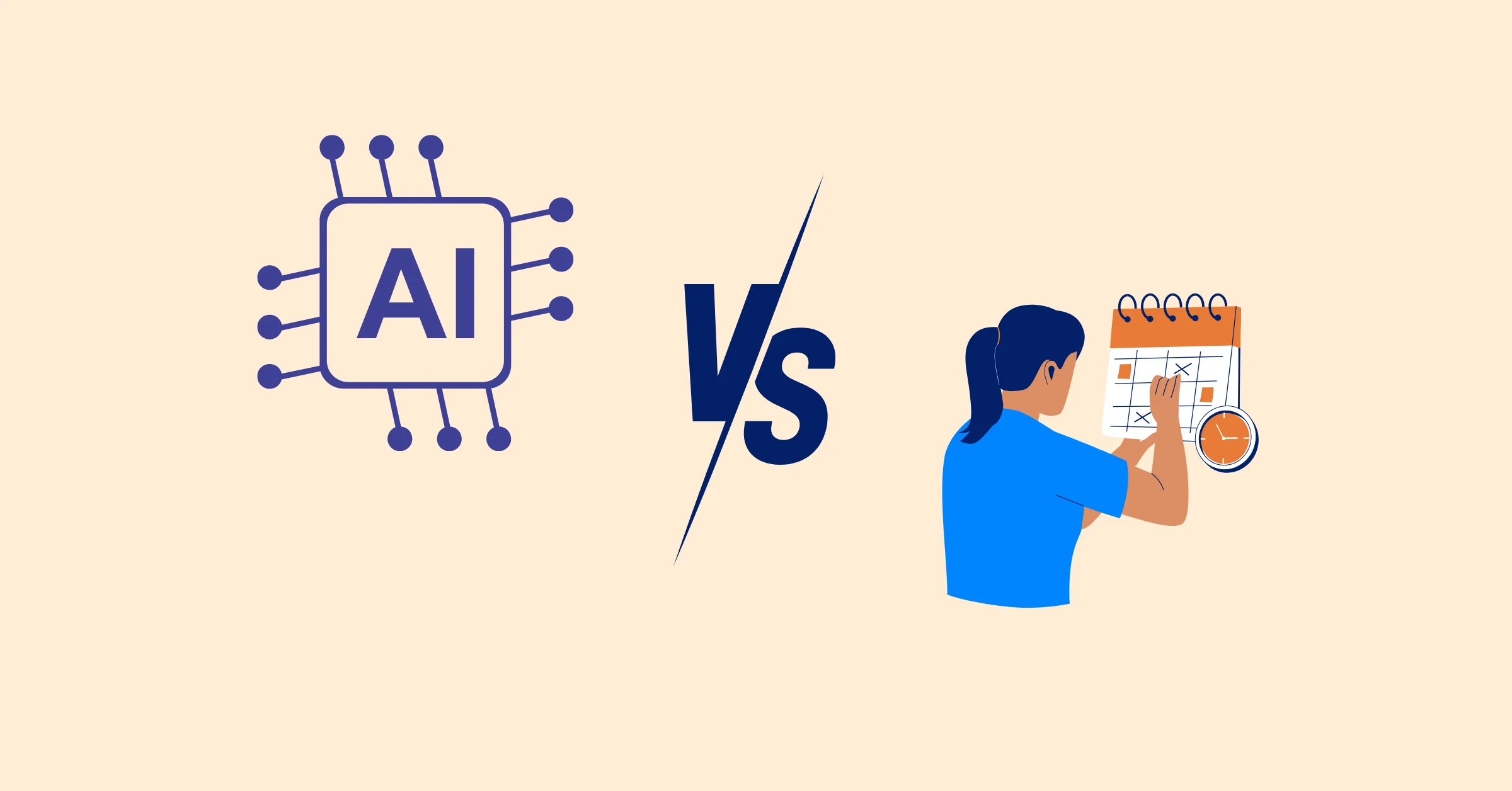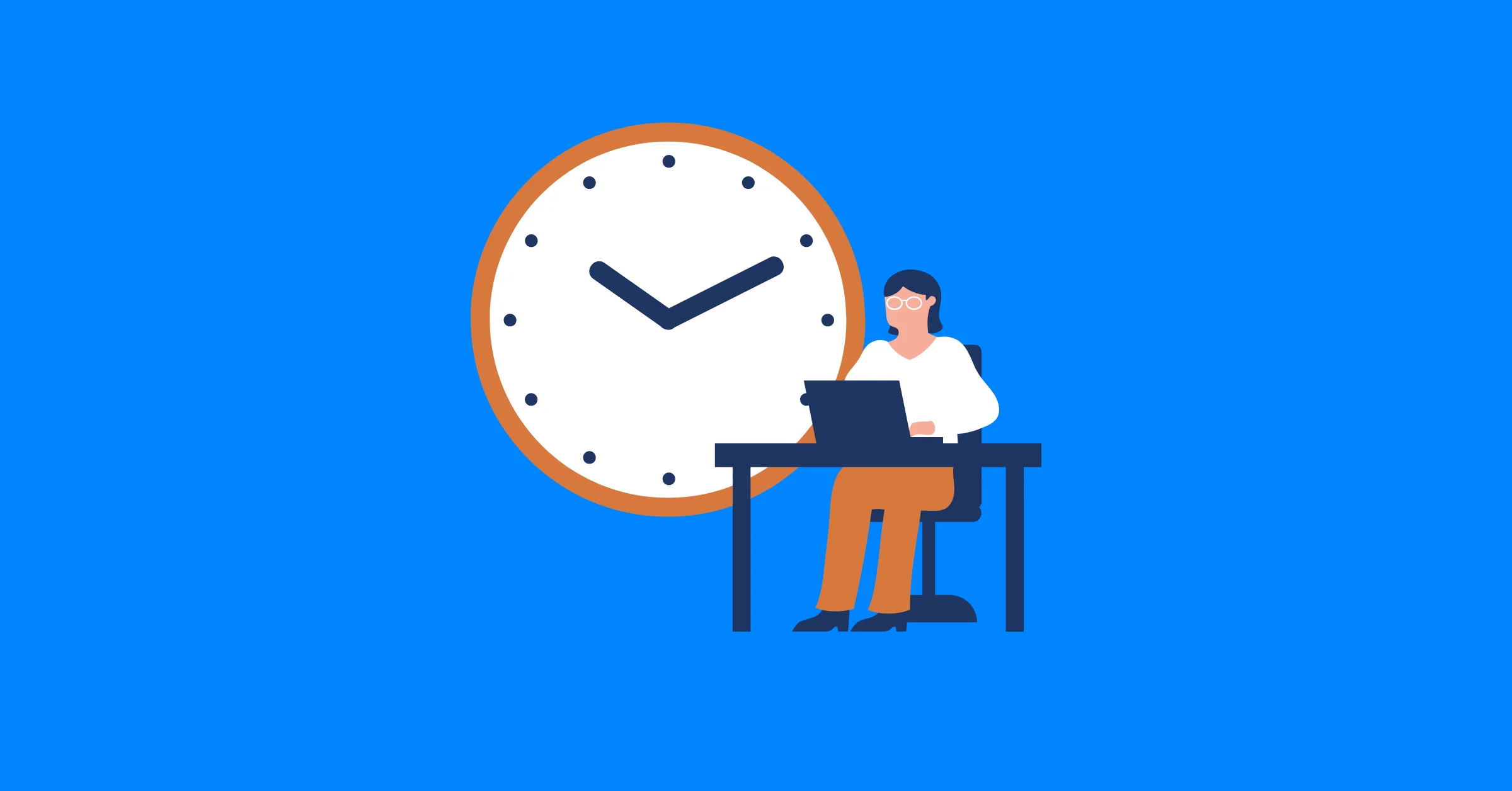Transform Your Schedule with 8 Time Management Strategies for Quick Wins
Discover 8 effective time management strategies to boost productivity, reduce stress, and take control of your schedule for quick wins and lasting success.
We all have the same 24 hours in a day, but why do some people seem to accomplish so much more than others? The answer lies in effective time management. It’s not about working harder or longer hours, but about working smarter and making the most of every moment.
In this guide, we’ll explore 8 powerful time management strategies that will help you get more done with less stress. Whether you're juggling work tasks, personal commitments, or long-term projects, these strategies are designed to fit seamlessly into your busy life and provide you with the tools you need to boost productivity, stay organized, and achieve your goals.
Ready to take control of your day and start working smarter? Let’s jump in!
What is Time Management?
Time management is all about making the most of the time you have. It’s the art of organizing and planning your day so that you can get things done efficiently and effectively. Rather than rushing through tasks, good time management helps you focus on what truly matters, avoid distractions, and make steady progress toward your goals.
When you manage your time well, you not only get more done, but you also reduce stress and improve your overall sense of control. It’s about setting priorities, staying on track, and making sure you're putting your time and energy into things that align with your values and long-term objectives.
Whether you're balancing work, family, or personal goals, mastering time management allows you to live with purpose and achieve the success you’re striving for.
The Benefits of Time Management
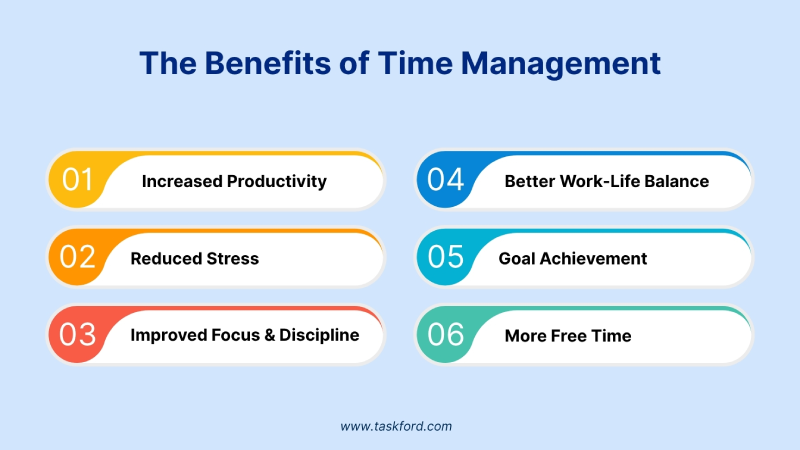
- Increased Productivity: By focusing on what truly matters, you accomplish more in less time. Effective time management helps you complete tasks faster and with better quality, leaving more room for what’s important.
- Reduced Stress: When you prioritize tasks and structure your schedule, you can avoid the chaos of last-minute rushes. This creates a sense of calm and control, making your day feel more manageable.
- Improved Focus and Discipline: Time management helps you stay on task and minimize distractions. With clear time blocks for specific activities, you can keep your attention on one thing at a time, leading to better results and greater efficiency.
- Better Work-Life Balance: Allocating time for work, personal goals, and rest ensures that you have space for family, hobbies, and self-care, without feeling overwhelmed or burnt out.
- Goal Achievement: Time management breaks down big goals into smaller, more manageable steps. Staying organized and on track allows you to make steady progress, turning your long-term objectives into achievable milestones.
- More Free Time: Ironically, managing your time well actually gives you more of it! Working efficiently means less wasted time, which opens up more opportunities to relax, enjoy your personal life, and tend to other important activities.
In short, good time management can change the way you work and live, helping you create more opportunities for success while keeping stress at bay.
8 Time Management Strategies to Peak Productivity
Now that we’ve covered the importance and benefits of time management, it’s time to implement some powerful strategies that will help you maximize productivity and stay organized.
These 8 time management strategies are designed to give you quick wins, helping you stay on track, reduce stress, and accomplish more in less time.
1. Prioritize with the Eisenhower Matrix
The Eisenhower Matrix is a time management tool that helps you sort tasks based on urgency and importance. It divides tasks into four categories:
- Urgent & Important: Do these tasks immediately.
- Not Urgent & Important: Schedule time to do these tasks.
- Urgent & Not Important: Delegate these tasks if possible.
- Not Urgent & Not Important: Eliminate or minimize these tasks.
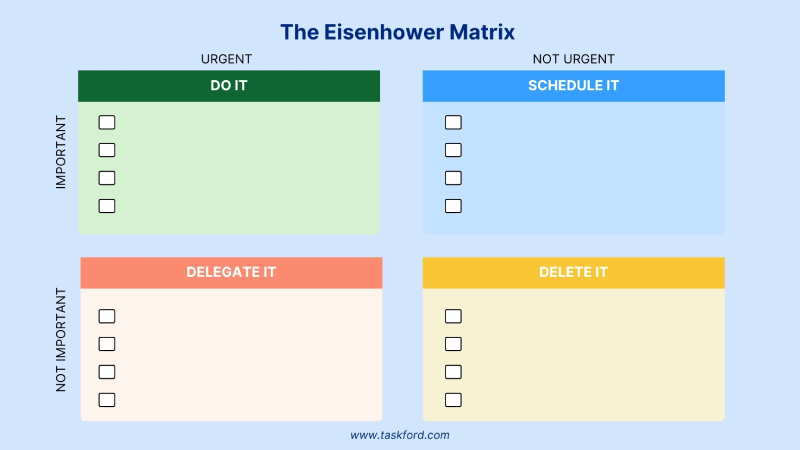
By focusing on what’s truly important, you avoid wasting time on low-priority tasks and ensure that your energy is directed toward the most valuable activities. This tool also helps you avoid the stress of last-minute rushes and makes decision-making clearer.
Learn more about how to prioritize tasks when there’s too much to do.
2. Set SMART Goals
Setting Smart goals (Specific, Measurable, Achievable, Relevant, Time-bound) is crucial for creating a clear roadmap for success. Rather than vague or broad goals like "get more work done," SMART goals help you break down tasks into actionable steps that are easy to track and measure. For example:
- Specific: "Complete a report on Q2 sales performance."
- Measurable: "Write 500 words per day."
- Achievable: "Finish the report by Friday."
- Relevant: "This report will help us analyze growth."
- Time-bound: "Complete the report by 5 p.m. Friday."
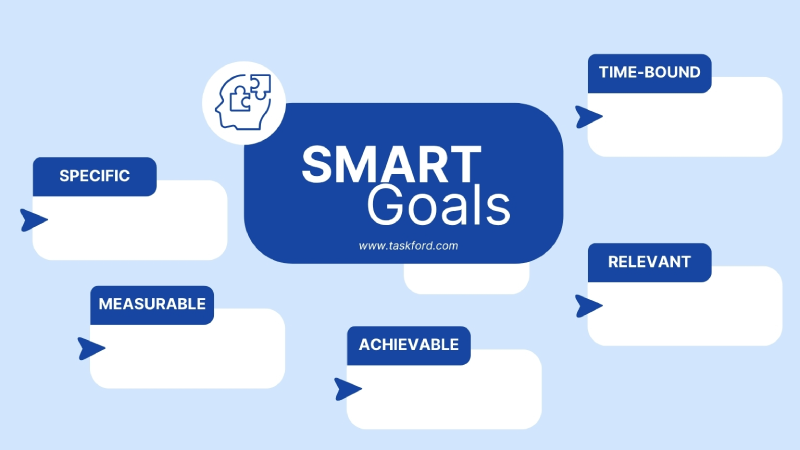
By setting SMART goals, you eliminate ambiguity and keep yourself accountable, ensuring you're making consistent progress toward your larger objectives.
3. Time Blocking for Focused Work
Time blocking is the practice of dividing your day into blocks of time, each dedicated to a specific task or group of tasks. It eliminates distractions and allows you to focus on one thing at a time, instead of constantly switching between tasks. This method can also help prevent burnout by ensuring you take regular breaks throughout the day.
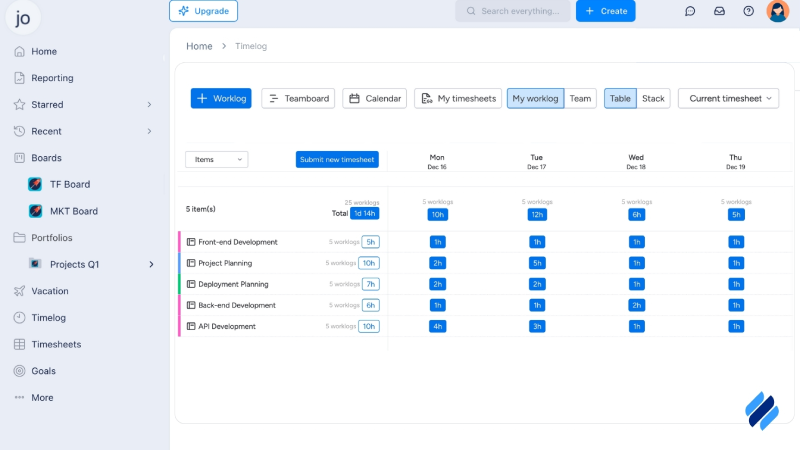
For example, you might allocate 9-11 a.m. for project work, 11-12 p.m. for emails, and 1-3 p.m. for meetings. By creating a structured schedule, you’ll find yourself accomplishing more without feeling overwhelmed. This also helps you stay on track and avoid wasting time deciding what to do next.
4. Embrace the Pomodoro Technique
The Pomodoro Technique is a productivity method that encourages focused work in short bursts. You work for 25 minutes and then take a 5-minute break. After four Pomodoros, take a longer break (15-30 minutes). The technique is based on the idea that the brain works best in concentrated, uninterrupted intervals, with regular rest to recharge.
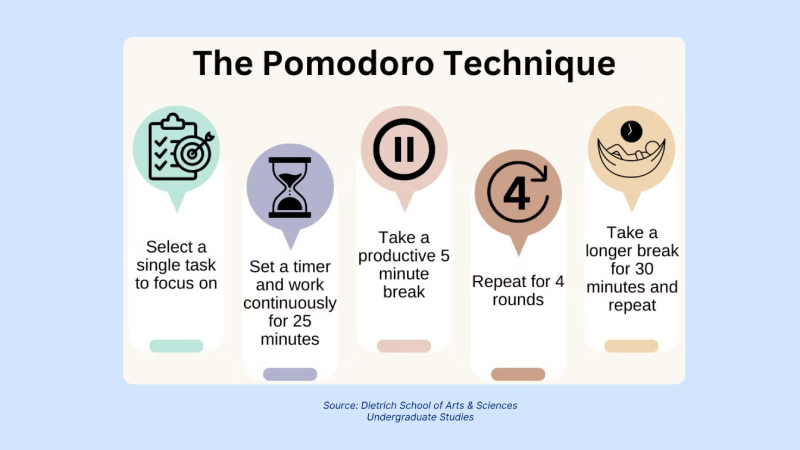
Using Pomodoro can help you stay focused and avoid the mental fatigue that comes from long hours of work. It’s particularly useful for large, daunting tasks, as it breaks them down into manageable segments.
5. Utilize a Project Schedule or Calendar
A solid project schedule is essential for managing your time effectively. Whether you prefer a physical planner or a digital tool, having a clear way to track tasks, deadlines, and milestones ensures nothing gets overlooked.
Physical planners can be great for those who like the satisfaction of physically crossing off completed tasks, giving them a tangible sense of progress. However, digital calendars and project management tools such as TaskFord take it a step further. The app allows you to easily organize your tasks, set reminders, and share schedules with team members to keep everyone aligned.
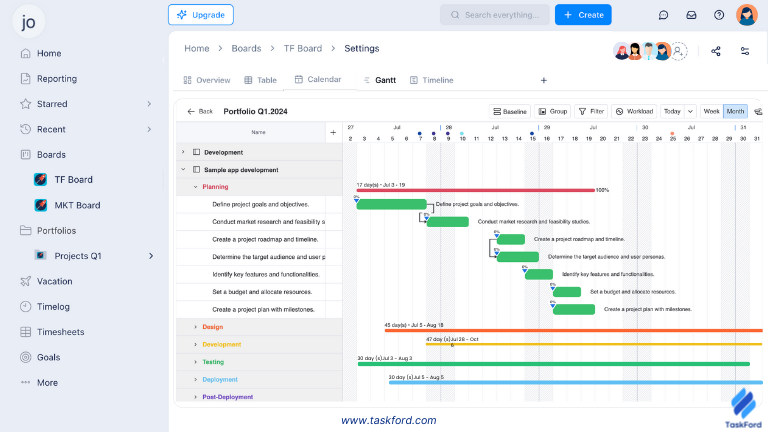
TaskFord’s project planning features help you visualize deadlines, milestones, and key deliverables in a clear, easy-to-follow format. The platform’s interactive calendar ensures that you stay on top of everything, while also giving you the flexibility to balance work and personal commitments with ease.
6. Apply the Two-Minute Rule for Instant Productivity
The Two-Minute Rule is a simple but highly effective technique to boost your productivity instantly. The idea is straightforward: if a task can be completed in two minutes or less, do it immediately.
This rule helps prevent small tasks from piling up and overwhelming you later. Whether it’s replying to a quick email, scheduling a meeting, or making a short phone call, handling these little tasks right away clears them off your to-do list and frees up your mental space. By tackling these quick wins, you not only keep your day moving smoothly but also reduce the clutter of unfinished tasks, making room for more significant projects and reducing the mental load of having “small things” lingering.
7. Automate Repetitive Tasks
One of the best ways to save time and reduce mental fatigue is by automating recurring tasks. From email management to scheduling meetings, many of the tasks we perform daily can be streamlined with automation, allowing you to focus on more important work.
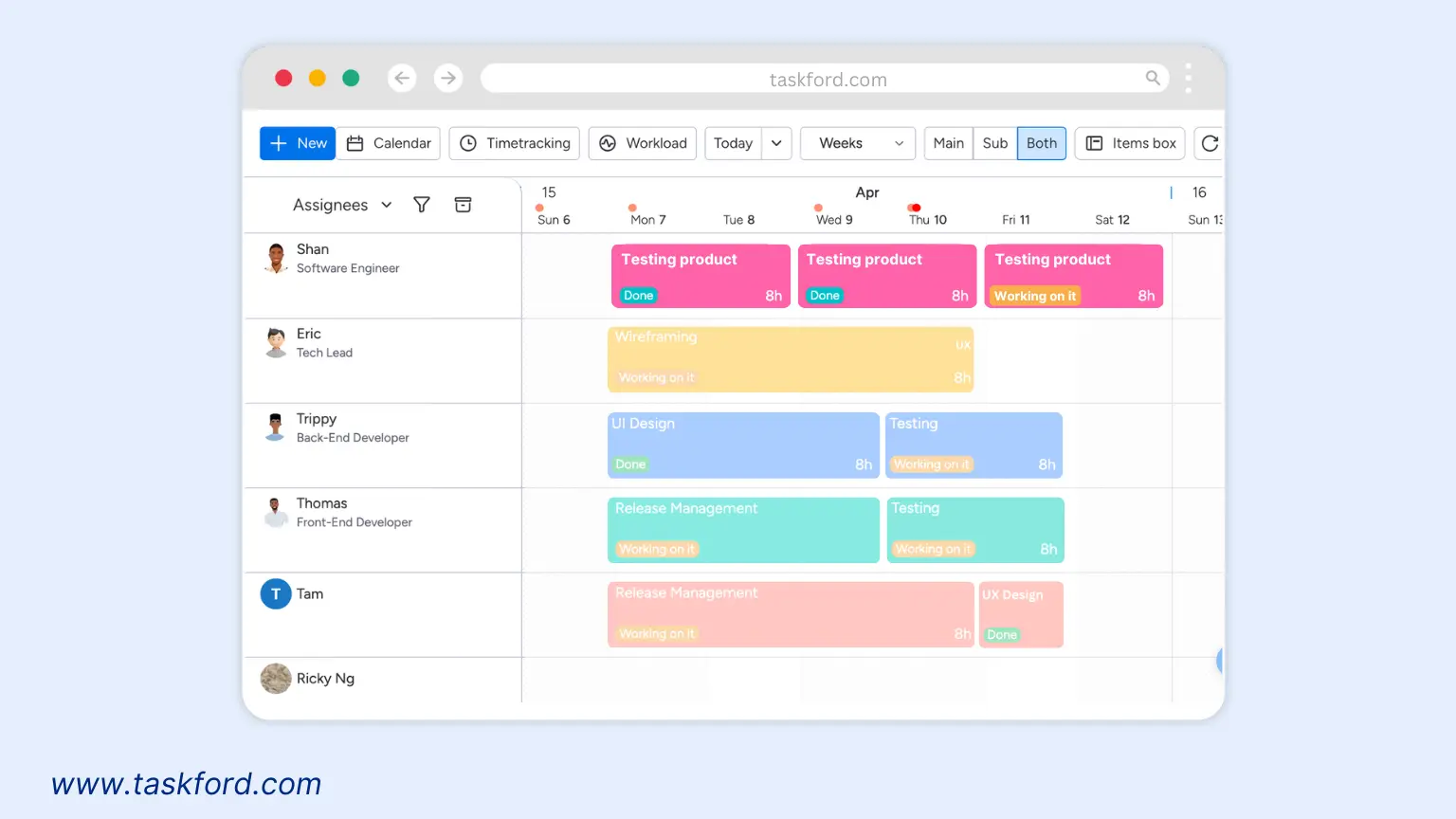
Automation tools can help you set up reminders, send follow-up emails, or handle routine data entry. For example, email filters can automatically sort your inbox, while scheduling tools can handle meeting requests without you lifting a finger.
By automating these time-consuming tasks, you not only improve efficiency but also free up mental energy to focus on high-priority work, ultimately boosting your productivity.
8. Say No More Often
One of the most powerful time management skills is learning how to say No. While it can be challenging, especially in a work environment that demands constant attention, saying no is essential for protecting your time and energy.
When you say yes to everything, you end up spreading yourself too thin, which can lead to burnout and decreased productivity. By saying no to low-priority tasks, unnecessary meetings, or requests that don’t align with your goals, you make room for the things that truly matter.
Being selective about where you invest your time helps you focus on high-value tasks and maintain a better work-life balance. Saying no isn’t about being rude; it’s about setting boundaries to ensure that your time is spent on what aligns with your priorities and long-term objectives.
How to Apply These Strategies to Your Schedule
Integrating time management strategies into your daily routine can transform chaos into clarity. Here’s how to effectively apply the 8 strategies to your schedule for quick wins and sustained productivity:
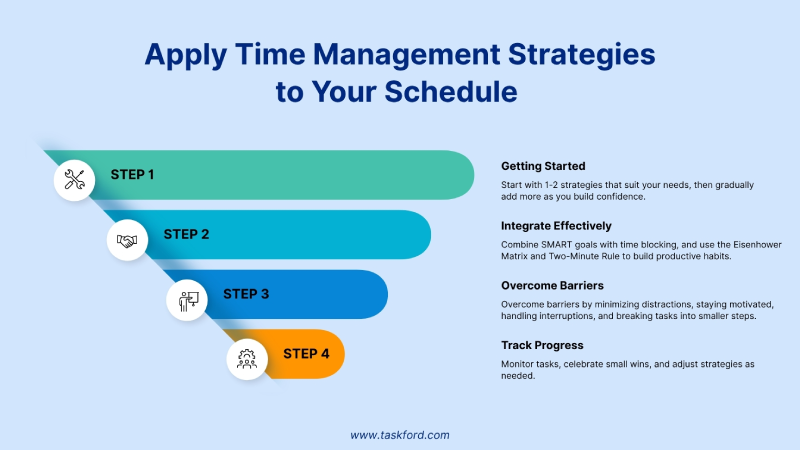
Getting Started
- Start Small: Begin with 1-2 strategies that resonate most. For example, try the Eisenhower Matrix to prioritize tasks and time blocking to structure your day. Gradually incorporate others as you build confidence.
- Assess Your Needs: Identify your biggest time management pain points (e.g., procrastination, overcommitment). Choose strategies like the Pomodoro Technique or saying no more often to address specific challenges.
Integrate Effectively
- Combine Tools: Use SMART goals with time blocking, or pair Pomodoro with a digital calendar (e.g., Google Calendar).
- Build Habits: Prioritize tasks each morning with the Eisenhower Matrix; tackle quick tasks using the Two-Minute Rule.
Overcome Barriers
- Distractions: Silence notifications during focused sessions; create a distraction-free workspace.
- Low Motivation: Start with a two-minute task or one Pomodoro to build momentum.
- Interruptions: Schedule buffer time; decline or delegate low-priority requests.
- Overwhelm: Break tasks into smaller SMART goals or Pomodoro chunks.
Track Progress
- Monitor: Log tasks in a journal or app (e.g., Todoist); review weekly.
- Celebrate: Acknowledge small wins to stay motivated.
- Adjust: Tweak strategies (e.g., time block length) to suit your needs.
Conclusion
Effective time management is the key to boosting productivity and reaching your goals. By implementing these 8 strategies, you can take control of your schedule, reduce stress, and create more time for what truly matters. Start by experimenting with one or two strategies, then gradually build them into lasting habits.
Take the first step today: try a quick Pomodoro session or say No to a non-essential task, and notice the difference. Share your progress in the comments – what’s your go-to strategy for conquering your day? As Benjamin Franklin wisely said,
“Lost time is never found again.” Make every moment count!
Related Reading
- 10 Practical Time Management Tools & Techniques That Actually Work
- Proper Time Tracking On Tasks Project Management Lead Better Results.
- What’s Next for Time Tracking Software? Key Innovation to Watch in 2025
- Manual vs. Automated Time Tracking: Which Method Saves You More Time?
Making work simpler,
smarter, and more connected
Join our waitlist and be notified first.

Subscribe for Expert Tips
Unlock expert insights and stay ahead with TaskFord. Sign up now to receive valuable tips, strategies, and updates directly in your inbox.

